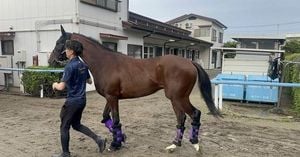The Irkutsk region hosted its second regional forum for volunteers and supporters of the special military operation (SVO) titled "We Don't Abandon Our Own!" on March 15-16, 2025, at the House of Youth and the Trud Stadium. The initiative, organized under the auspices of the ruling United Russia party, drew attention to the extensive support framework established for SVO participants and their families.
Minister of Social Development, Guardianship, and Trusteeship of the Irkutsk Region, Vladimir Rodionov, unveiled comprehensive data outlining the various support structures. "We try to bring participants of the special military operation or their family members to work in these departments. This is extremely important for us since these people perceive more acutely the pain and problems faced by those who have gone through SVO," he explained during the forum.
At the heart of the region's assistance strategy are municipal headquarters set up across 42 local municipalities—typically headed by mayors or their deputies specializing in social work. Rodionov asserted the importance of interdepartmental collaboration, stating, "A regional interdepartmental commission under the governor is regularly assembled to tackle these issues collectively," emphasizing the united effort necessary for efficient assistance.
Each department of social protection is equipped with special units designated to help SVO participants and their families. These units work closely with non-profit organizations including the 'Defenders of the Fatherland' Support Fund and local groups such as the Russian Union of Rural Women and Soldiers' Mothers of Priangarye. The efforts of these volunteers are invaluable; last year, over 6,000 calls were received from families involved in the unified contact center, which has been operating since its establishment in September 2022.
Rodionov also highlighted the creation of the Family Support Center for SVO participants back in December 2022, which successfully addressed more than 20,500 individual requests for assistance. This expansive outreach emphasizes the involvement of volunteers who participated in over 45,000 activities aimed at assisting both SVO participants and their families, showing the strong community engagement surrounding these issues.
Importantly, the regional government has implemented 39 specific measures of social support for those involved in the SVO and their families. From the allocated budget of more than 10 billion rubles, substantial funding is directed toward direct payments for military personnel, which have recently increased to 1 million rubles for individuals who signed contracts since March 2025.
Notably, housing support for children orphaned or left without parental care has been highlighted as unique to the Irkutsk region. "I don't know of any other regions offering such measures. We have helped 101 people previously, with numbers rising to 106 last year and continuing support for 38 individuals who signed contracts this year," he added.
Additional support measures also encompass subsidies for firewood purchase, meals for children at educational institutions, and access to sanatorium treatments. Every effort contributes to creating new avenues for SVO participants to transition back to civilian life successfully, with Rodionov expressing optimism about the future. "We are very happy to see the guys returning from the SVO ready to do business, and we are helping them with this," he noted.
One significant aspect of the support system is the compilation of social passports—detailed documents containing personal and family histories relevant to the needs of both the participants and their families. So far, the region has assembled over 20,000 social passports, establishing comprehensive data to track the assistance required and ensuring no family falls through the cracks.
"If we unite our efforts, we will move mountains, providing help to everyone who needs it and who is ready to accept help," Rodionov concluded, reitering the significance of collective action and community support.
The region is also advancing its Long-Term Care System (SDU), focused on aiding SVO returnees facing severe injuries. This initiative ensures home care for participants, which has proved more effective than institutional care. Family members are employed to provide necessary care, with outlays ranging from 30 to 48 thousand rubles monthly, enabling veterans to benefit from personal, familiar environments during recovery.
Further developments are seen through rehabilitation programs with leading resorts like 'Angara', 'Rus', and 'Usolye' facilitating sanatorium treatments. The plans include issuing 470 preferential vouchers this year alone; each treatment period spans 14 days, aimed at speeding up recovery and reintegration.
The Irkutsk Rehabilitation College, uniquely catering exclusively to disabled individuals, is also being restructured to support SVO participants with specific training programs for future employment opportunities. Facilities are being enhanced, allowing intake throughout the academic year—not just at the start—inclusively accommodating those from outside the region.
Rodionov is confident about the direction the Irkutsk region is taking, with plans to fully rehabilitate the Shelekhov rehabilitation center by 2027 to cater to SVO participants and their families. Through allocated funds, significant renovations and required medical equipment will be provided, ensuring the best possible rehabilitation assistance for individuals affected by conflict.
Access to up-to-date information on available support can be found through INFOLIGHT38, the centralized communication resource tasked with disseminatng information about assistance for SVO participants, including real-time consultations. The Minister concluded with emphasis on the responsibility of the community to come together for those who have served: "We have vast work to do, especially as more and more participants return to their homes. It's our duty to provide support wherever it's needed."



